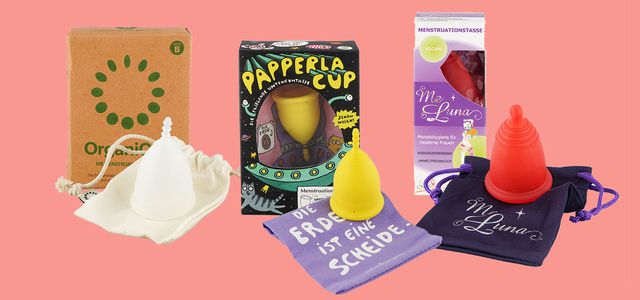
Almost all menstrual cups can recommend Öko-Test. But of all things one of the most expensive products disappointed in the test. It contains a critical silicone compound that is considered toxic to reproduction.
Menstrual cups are becoming increasingly popular, especially among younger women. In contrast to tampons and sanitary napkins, there is no waste with the flexible menstrual cups. The cups last for several years with good care and are therefore considered more sustainable. But is that also true and what about the ingredients?
Öko-Test examined 15 menstrual cups in the laboratory for harmful substances and subjected them to a stress test: does the cup hold and are there plasticizers and potentially harmful silicone compounds in the cups? In the evaluation, Öko-Test placed particular emphasis on the fact that there are no critical substances in the menstrual cups. More than half of the products tested do it and are “very good”.

(Photo: © Utopia)
Menstrual cups in the test: more than half are “very good”
Menstrual cups are almost always made of medical grade silicone. Only two of the cups tested are made of thermoplastic elastomer (TPE). Silicone is generally considered to be well tolerated and food-safe, but TPE products were also convincing in the test. The “very good” products include:
- Papperla Cup menstrual cup (yellow) by Einhorn, online ** u.a. at Amazon
- Me Luna Classic menstrual cup (red)
- Organi Cup The menstrual cup (size B), online ** etc. at Avocadostore or Ecco Verde
The cup from Me Luna is made of thermoplastic elastomer, the other two menstrual cups made of silicone. Öko-Test found no pollutants in any of the three products.
Öko-Test tampons and menstrual cups – All test results as PDF**
Menstrual cups with volatile compounds
In four of the menstrual cups tested, silicone blocks can come loose, writes Öko-Test. These volatile compounds can form, for example, if the cups have not been sufficiently heat-treated after production. According to the Öko-Test, these connections can environmentally hazardous be, which is why the affected products only performed “satisfactorily”.
The silicone component D4 from the Ruby Cup (Medium). It is “as toxic to reproduction and environmentally hazardous classified “, write the consumer experts in April magazine. That’s why the Ruby Cup did the worst.
There are no warnings for menstrual cups
When using menstrual cups (just like with tampons), toxic shock syndrome (TSS) can occur. It is a very rare but life-threatening organ and circulatory failure.
According to doctors, it is believed to be associated with the use of tampons and menstrual cups. For this reason, the manufacturers should use the package leaflets to warn them and recommend that they see a doctor if they suspect TSS. While appropriate warnings are now common for tampon packaging, there are no detailed instructions for several menstrual cups, Öko-Test criticized.
Öko-Test tampons and menstrual cups – All test results as PDF**
Menstrual cups score with zero waste
From an environmental point of view, menstrual cups are more recommended than tampons and Tie. In contrast to other monthly hygiene products, they are not disposable products. With good care, they can be used for several years without any problems. How exactly the ecological balance is compared to tampons and sanitary napkins is difficult to say.
Öko-Test indicates that there are hardly any meaningful studies on this. In the trade magazine Resources, conservation and recycling According to a study from 2019, however, menstrual cups are significantly more sustainable than other products. Here, however, the authors only consider washing out the menstrual cup and not boiling it out. This requires more energy and water to boil. In our view, menstrual cups remain the better choice because they help prevent waste.
You can find all the details in the 04/2020 issue of Öko-Test and online at www.ökotest.de.
Read more on Techzle.com:
- Leaderboard: organic tampons, washable pads, menstrual cups & sponges
- Menstrual problems: These home remedies help
- Period underwear: how recommendable are period panties?